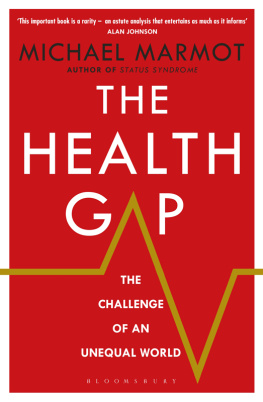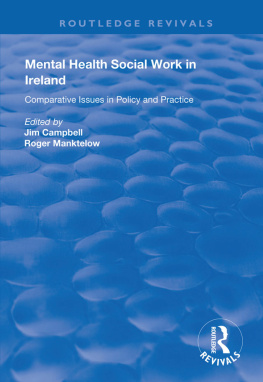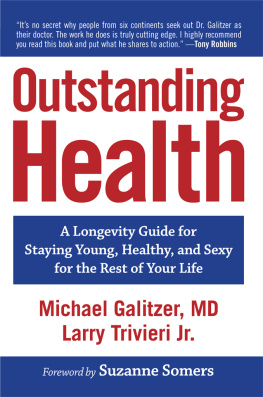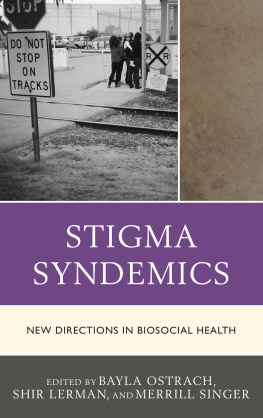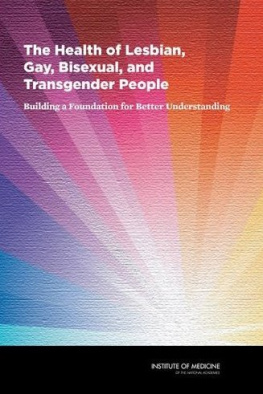Mortality of Immigrants to England and Wales (eds. Michael Marmot, Abe Adelstein and Luk Bulusu)
Coronary Heart Disease from Epidemiology to Public Health (eds. Michael Marmot and Paul Elliott)
Labour Market Changes and Job Insecurity (eds. Jane Ferrie and Michael Marmot, John Griffiths and Erio Ziglio)
Social Determinants of Health (eds. Michael Marmot and Richard Wilkinson) Stress and the Heart: Psychosocial Pathways to Coronary Heart Disease (eds. Stephen Stansfeld and Michael Marmot)
STATUS SYNDROME
How Your Social Standing Directly Affects Your Health
Michael Marmot

First published in Great Britain 2004
This electronic edition published in 2012 by Bloomsbury Publishing Plc
Copyright 2004 by Michael Marmot
The moral right of the author has been asserted
All rights reserved. You may not copy, distribute, transmit, reproduce or otherwise make available this publication (or any part of it) in any form, or by any means (including without limitation electronic, digital, optical, mechanical, photocopying, printing, recording or otherwise), without the prior written permission of the publisher. Any person who does any unauthorised act in relation to this publication may be liable to criminal prosecution and civil claims for damages.
Bloomsbury Publishing Plc, 50 Bedford Square, London WC1B 3DP
A CIP catalogue record for this book is available from the British Library
ISBN: 9781 4088 34190
www.bloomsbury.com/michaelmarmot
Visit www.bloomsbury.com to find out more about our authors and their books You will find extracts, author interviews, author events and you can sign up for newsletters to be the first to hear about our latest releases and special offers
To Alexi, Andr, Daniel and Deborah
The success of an economy and of a society cannot be separated from the lives that members of the society are able to lead we not only value living well and satisfactorily, but also appreciate having control over our own lives.
Amartya Sen, Development as Freedom (1999)
Contents
We have remarkably good health in the rich countries of the world. Malaria is long gone from Europe and the US. Parasitic diseases do not wreak havoc with our lives. When we give birth, we can reasonably expect that fewer than one child in a hundred will die in the first year of life. What a good time to be alive. Except that it is better for some than others considerably so. Where you stand in the social hierarchy on the social ladder is intimately related to your chances of getting ill, and your length of life. And the differences between top and bottom are getting bigger, and have been for a generation.
Let me translate where you stand in the social hierarchy. You are not poor. You are employed. Your children are well fed. You live in a decent house or apartment. You turn on the tap and drink the water in the secure knowledge that it is clean. The food you buy is not contaminated. Most people you come across in your daily round also meet this description. But, among these people, none of whom is destitute or even poor, you acknowledge that some are higher than you in the social hierarchy: they may have more money, bigger houses, a more prestigious job, more status in the eyes of others, or simply a higher-class way of speaking. You also note that there are other people lower than you on these criteria, not just the very poor or the homeless, but people whose standing is merely lower than yours, to a varying extent. The remarkable finding is that among all of these people, the higher the status in the pecking order the healthier they are likely to be. In other words health follows a social gradient. I call this the status syndrome.
This is really rather surprising. More, this is really astonishing. Why should educated people with good stable jobs have a higher risk of dropping dead than people with a bit more education or slightly higher-status jobs? Is living in a five-bedroom house with three bathrooms better for your health than crowding the spouse and two children into a four-bedroom house with only two? Why, since I asked, should living in a four-bedroom house be better for your health than living in a clean, dry, warm, three-bedroom apartment? Why should someone with a masters degree have a longer life expectancy than someone with a bachelors?
The answer that I shall lay out in this book, is that for people above a threshold of material well-being, another kind of well-being is central. Autonomy how much control you have over your life and the opportunities you have for full social engagement and participation are crucial for health, well-being and longevity. It is inequality in these that plays a big part in producing the social gradient in health. Degrees of control and participation underlie the status syndrome.
Sounds simple, I hope. But those two sentences about control and participation took more than twenty-five years of research to formulate. In the age of the genome and high-tech medical care, thinking about health typically turns to biology and technology. The discovery of how important control and participation are for health leads in a different direction: to the circumstances in which we live and work. In other words, this is health research that leads us to focus, not on access to the latest medical technology, but on the way we think about the sort of lives we want for ourselves, and the sort of society in which we want to lead them. What started out as a research programme into the causes of inequalities in health between social groups ended up as an inquiry into what is best and worst about the way we live.
These social inequalities in health the social gradient are not a footnote to the real causes of ill-health in countries that are no longer poor; they are the heart of the matter. Status syndrome can be illustrated by a short ride on the Washington DC subway. Travel from the southeast of downtown Washington to Montgomery County Maryland. For each mile travelled life expectancy rises about a year and a half. There is a twenty-year gap between poor blacks at one end of the journey and rich whites at the other. Men in Japan have the longest life expectancy in the world at 77; men in Kazakhstan in the former Soviet Union are way down at 57. Within Washington and its environs, we see differences as big. These are the ends of the spectrum the rest of the developed worlds population is ranged in between.
If I am going to argue that the way we organise society leads to inequality in the lives people are able to lead, then we must look at the health impact of how different societies organise themselves. It is not just that health researchers like to travel. We do, but I am such a nerd that when I travel I come back not with holiday snaps but with the heart-disease statistics. Have you seen the beaches in Cuba? Yes, and life expectancy there is 73.7 for men and 77.5 for women. What did you think of the Hermitage Museum in St Petersburg? Wonderful, but life expectancy in Russia has sunk to 57 for men and 72 for women. We shall have to travel to look at what we can learn from observation of how health in different societies may be related to features of those societies, and especially, how the social gradient in health varies from society to society.
The contrasts in Washington DC demand attention, because healthy and unhealthy live cheek by jowl. The findings of a health gradient are, however, remarkably general. The wide corridors of power of the British civil service are about as far as one can get conceptually from the down-at-heel streets of Washington DC as the developed world allows. But there, dramatically, is evidence of the status syndrome. I began my research on civil servants in 1976 with the Whitehall studies and found a social gradient in health.found big and growing social differences in health within those countries as well as a growing gap in health between them and the flourishing countries of Western Europe. Even in Japan, whose health record is the envy of the world, we find evidence of the status syndrome.


